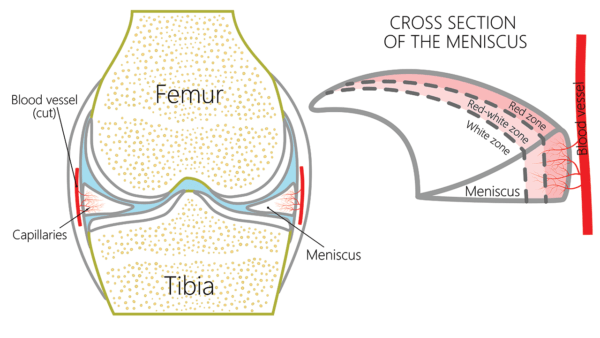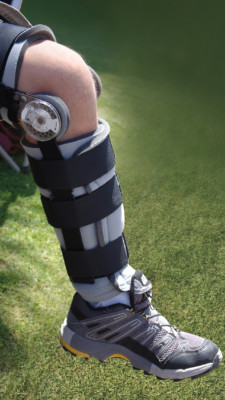Meniscus Tear Recovery Time Without Surgery
On this page:
- Can a meniscus tear heal on its own?
- What happens if you leave a torn meniscus untreated?
- How can I improve my chances of the meniscus healing on its own?
- Does meniscus surgery work?
- Can you treat a meniscus tear without surgery?
What is the meniscus tear recovery time without surgery? If my meniscus doesn’t heal on its own should I get surgery? Whether or not you get surgery for a meniscus tear depends on what we know about whether surgery will help.
Regrettably, the research that shows that this common procedure is effective argues against surgery. Let’s take a closer look.
Can a Meniscus Tear Heal on Its Own?

Aksanaku/Shutterstock
Before we get into meniscus tear recovery time without surgery, let’s review a bit. The meniscus is a figure 8 shaped structure that acts as a spacer between the thigh and shin bones in the knee. It has several zones based on blood supply with the best blood flow being on the outside and the least on the inside.
These zones are called the red-ed (lots of blood supply), red-white (some blood supply), and white-white (no blood supply). The diagram here is a cross-section of the meniscus that shows those three distinct areas.
Why is all of this important? Because where the tear is located determines it’s healing potential. Tears in the red-red zone (outside of the meniscus) are more likely to heal and tears in the red-white may heal.
However, tears in the white-white are unlikely to heal. If the tear does heal it should take 6 to 8 weeks (1). Hence, if you have a tear in the outer half of the meniscus, focusing on meniscus tear recovery time without surgery is reasonable. However, if your tear doesn’t heal or it’s in the non-healing part of the meniscus, what should you do?
What Happens if You Leave a Torn Meniscus Untreated?
What’s interesting about this question is that most people over age 35 have meniscus tears that they don’t know about. Meniscus research clearly shows that tears are about as common as wrinkles and often about as important. Hence, leaving a meniscus tear untreated is usually not a big deal, since many of your friends likely have them and don’t know about them.
How Can I Improve My Chances of the Meniscus Healing on Its Own?

James Steidl/Shutterstock
In my experience, you can shorten meniscus tear recovery time without surgery by using an unloader brace. This is a specialized brace you can buy online that pushes or pulls on the opposite side of the tear to take the weight off that torn meniscus.
So for example, if you have a medial meniscus tear, then you would use a medial unloader for 4 to 6 weeks. If you have a lateral meniscus tear, then a lateral unloader. These can be purchased online for a few hundred dollars or most insurers will cover them as well.
Does Meniscus Surgery Work?
If your meniscus won’t heal or at least if your knee pain doesn’t go away, do we know that surgery will work? After all, meniscus surgery is one of the most common orthopedic procedures performed today. The answer for the most common type of surgery called arthroscopic partial meniscectomy (APM) is a firm “no.” How can that be? Let’s review.
We have three very high-level studies that show that no matter what’s wrong with your knee (meniscus tear with or without arthritis or locking), the surgery is no better than a fake procedure or physical therapy (4, 5, 6). Many surgeons will argue that these studies only looked at the responses of large groups of people and that they are better at picking who will respond.
However, we now have newer research that shows that there is no identifiable sub-group of patients who will respond to APM (7).
In fact, we’re starting to see that the removal of the torn part of the meniscus that occurs in APM may cause more arthritis (2, 3). Why? The procedure likely increases the forces on the cartilage by removing parts of that meniscus spacer, which likely still has some protective effect even when torn.
Can You Treat a Meniscus Tear without Surgery?
Some promising injection-based treatments to improve meniscus tear recovery time without surgery are being explored with some showing benefit. Both approaches focus on ramping up healing in the tissue. One is precisely injecting platelet-rich plasma (PRP) into the meniscus using ultrasound guidance (8).
Injecting bone marrow mesenchymal stem cells has also shown promise (9). We’ve been using both of these techniques for more than a decade with good clinical results in helping patients avoid meniscus surgery.
The upshot? Meniscus tear recovery time without surgery is 6 to 8 weeks. However, if your knee doesn’t improve, please don’t sign up for the most common orthopedic surgery called APM as it’s been shown to be ineffective despite its wide use. In the meantime, newer techniques to help the knee are available.
____________________________________
References
(1) Beaufils P, Becker R, Kopf S, Matthieu O, Pujol N. The knee meniscus: management of traumatic tears and degenerative lesions. EFORT Open Rev. 2017;2(5):195-203. Published 2017 May 11. doi:10.1302/2058-5241.2.160056
(2) Fairbank TJ. Knee joint changes after meniscectomy. J Bone Joint Surg Br. 1948;30B(4):664-670.
(3) Baratz ME, Fu FH, Mengato R. Meniscal tears: the effect of meniscectomy and of repair on intraarticular contact areas and stress in the human knee. A preliminary report. Am J Sports Med. 1986;14(4):270-275. doi:10.1177/036354658601400405
(4) Katz JN, Brophy RH, Chaisson CE, et al. Surgery versus physical therapy for a meniscal tear and osteoarthritis [published correction appears in N Engl J Med. 2013 Aug 15;369(7):683]. N Engl J Med. 2013;368(18):1675-1684. doi:10.1056/NEJMoa1301408
(5) Sihvonen R, Paavola M, Malmivaara A, et al. Arthroscopic partial meniscectomy versus sham surgery for a degenerative meniscal tear. N Engl J Med. 2013;369(26):2515-2524. doi:10.1056/NEJMoa1305189
(6) Beaufils P, Pujol N. Management of traumatic meniscal tear and degenerative meniscal lesions. Save the meniscus. Orthop Traumatol Surg Res. 2017;103(8S):S237-S244. doi:10.1016/j.otsr.2017.08.003
(7) Pihl K, Ensor J, Peat G, et al. Wild goose chase – no predictable patient subgroups benefit from meniscal surgery: patient-reported outcomes of 641 patients 1 year after surgery. Br J Sports Med. 2020;54(1):13-22. doi:10.1136/bjsports-2018-100321
(8) Kaminski R, Maksymowicz-Wleklik M, Kulinski K, Kozar-Kaminska K, Dabrowska-Thing A, Pomianowski S. Short-Term Outcomes of Percutaneous Trephination with a Platelet Rich Plasma Intrameniscal Injection for the Repair of Degenerative Meniscal Lesions. A Prospective, Randomized, Double-Blind, Parallel-Group, Placebo-Controlled Study. Int J Mol Sci. 2019;20(4):856. Published 2019 Feb 16. doi:10.3390/ijms20040856
(9) Vangsness CT Jr, Farr J 2nd, Boyd J, Dellaero DT, Mills CR, LeRoux-Williams M. Adult human mesenchymal stem cells delivered via intra-articular injection to the knee following partial medial meniscectomy: a randomized, double-blind, controlled study. J Bone Joint Surg Am. 2014;96(2):90-98. doi:10.2106/JBJS.M.00058
If you have questions or comments about this blog post, please email us at [email protected]
NOTE: This blog post provides general information to help the reader better understand regenerative medicine, musculoskeletal health, and related subjects. All content provided in this blog, website, or any linked materials, including text, graphics, images, patient profiles, outcomes, and information, are not intended and should not be considered or used as a substitute for medical advice, diagnosis, or treatment. Please always consult with a professional and certified healthcare provider to discuss if a treatment is right for you.